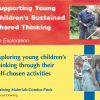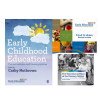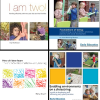Exploring the Wider World Project
The Exploring the Wider World Project was funded by the Stoke-on-Trent Opportunity Area and was delivered by Early Education between April 2019 and March 2020.
This page brings together all the key project elements of thinking through a trip or a visit in one handy place, with downloadable resources for you to plan from, to help you audit your practice, and to write an action plan to develop your practice further.
If you are thinking about where you might take your children for a meaningful experience, use this example of a mapping activity to identify where you might go that is age appropriate and where you can extend their learning.
As well as going out, you can look to bring the local environment in: here are our suggestions to enable this:
Auditing your current practice is important and is a key part of being a reflective practitioner. This audit will allow you to consider your areas of strengths and areas for development in the light of Understanding the World strand taken from Development Matters (2012).
Being prepared is key to success, especially when it comes to taking trips where there are lots of external factors that may come into play. Here are some resources to help with this so you can mitigate issues occurring:
If you are looking for a starting point for experiences relating to various places, we have created some suggestions for the museum, the canal, and the farm, and how you can make these happen – as well as blank possibility sheets for you to plan your own. Download these possibilities to develop in relation to your cohort of children’s experiences and interests:
We have created a possibility sheet for you to plan your own trips – with guidance for completion and a blank copy for your own planning:
Why not continue to extend the learning by exploring what your children are interested in through the medium of a selection of appropriate texts: we have made some suggestions here but would welcome further books or resources that you have used effectively with your children.
The Exploring the Wider World Project was funded by the Stoke-on-Trent Opportunity Area and was delivered by Early Education between April 2019 and March 2020.
The direction of the project has been dictated by three key factors: a deep understanding of how young children learn best, developing sustainability for practice,
Rethinking our consideration of what an outing or a visit may be has been central to the project. Children need to build up their knowledge
Using the local environment enables children to develop a sense of belonging to the local community. It helps them to develop a sense of place
An early task for the Exploring the Wider World project was to identify the barriers to taking children out and about beyond the setting. Only
Risk is a natural part of our existence, as we look to explore and make sense of the world around us. What is key is
Meaningful learning opportunities relating to understanding the world rely on rich and stimulating resources. Consider what you have Rich and well thought out resources make
A reflection based upon rich and varied experiences of taking young children out into the Wider World by Kathryn Solly, Early Education Associate. Beginnings There
It is important to remember that the world of a 2-year-old is very different to ours. They are hugely fascinated by the things that we
By the time children get to be 3 years of age, they are, generally, better at walking and so can walk for longer periods of
Most 4-year-olds can walk faster and further than their younger counterparts. This means that they can venture further afield than the three year olds in
Walking is a great way to stay active for people for all ages. Particularly for children, walking: is fun and interesting – you get to
Using public transport can be really exciting for young children, especially for those who spend lots of time in cars, being ferried from place to
Social media is a powerful tool for sharing examples of good practice and celebrating achievements – but there potential pitfalls, particularly relating to consent. We
Since the introduction of the EYFS framework in 2008 there has been a huge emphasis upon encouraging parents to become engaged in their children’s learning.
This article by Early Education Associate Anni McTavish explores the term “cultural capital”, and what it might mean for early years practitioners and their settings.
Transition is part of the maturation process. Most children and their families find moving from one stage to the next seamless. Transitions need careful planning and will
We know young children appear to be starting settings with less developed language than in previous years due to a range of reasons. Understanding the






Early Education
2 Victoria Square
St Albans
AL1 3TF
T: 01727 884925
E: office@early-education.org.uk